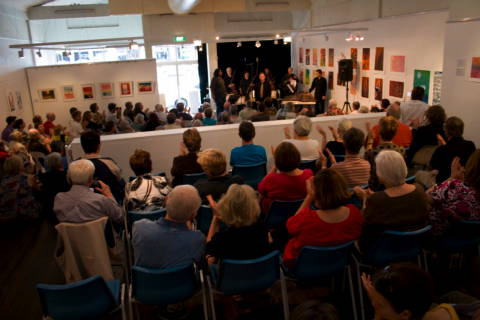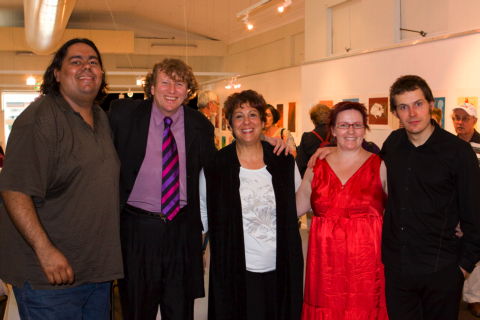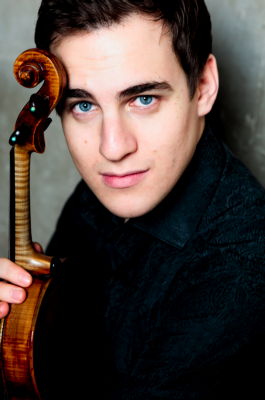|

Especially Successful
GILLIAN WILLS reports from
the Australian Festival of Chamber Music
Festivals are in abundance with more and more examples springing up all over the world. Many say that the Festival forum is an ideal way to reach audiences and also invaluable for airing new music, newcomers to the concert circuit and previously unsung talent. All of these aspects were present in The Australian Festival of Chamber Music [31 July to 8 August 2009] in its nineteenth and perhaps most successful year.

The audience at an AFCM concert at Umbrella Studios. Photo © 2009 James Ellis
|
The tropical location with its wintry climate of around twenty five degrees everyday and the proximity of Townsville to the Barrier Reef all make the AFCM an attractive proposition for sure, but this explains only a fragment of its attraction. Locals have acclimatised to this intimate mode of classical music making to such an extent that a taxi driver told Artistic Director Piers Lane 'no-one can even get married around here without a string quartet playing at the reception'. All types come to the concerts, yes, the silvery haired, moneyed, music lover variety but also youngsters, hairdressers, shop assistants and more. The AFCM is an iconic cultural event in this North Queensland town.
Lane has an eye and ear for a good team of players who are personable, reliable and flexible and who have an eclectic mix of styles in their fingertips. UK pianist Kathryn Stott, violinist Jack Liebeck and flautist Lorna McGhee, American cellist Zuill Bailey and Norwegian violinist Atle Sponberg blend well with the Australian contingent of the Goldner Quartet, pianist Ian Munro and the Camerata of St John's String Ensemble.
Like many Chamber Festivals, the players must blend into groups with musicians they have never worked with before to perform repertoire that requires detailed refinement in only one or two rehearsals. Curious about the strategies employed in these get-it-together-quick type of sessions I attended several rehearsals.
In one, involving Queensland clarinettist Paul Dean, Stott and cellist Louise Hopkins who were preparing Brahms' Clarinet Trio, all seemed initially edgy. After two readings, they sounded like they had a workable rapport. Stott quipped 'it's not always as comfortable as this -- it can be a beautiful thing or a people thing'. The performance of the Brahms (31 July) incidentally was extraordinarily exciting.
Another positive is Lane's canny cultivation of the audience. Lane hosts a 'Conversations With the Artists Series' in the Jupiter's Hotel Ballroom in which he fires teasing questions at the musicians. 'What kind of a name is Zuill -- how did you end up being called that?' he targeted at American cellist Zuill Bailey. After the question and answer session there's a performance involving the featured instrumentalists and the huge crowd, sitting around tables consuming coffee and pink frosted lamingtons -- an Australian delicacy -- is rapt. Guests and musicians stay in the comfortable Quest Apartments on Palmer Street and volunteers ferry performers, media and patrons to the concerts and related events.
These formal and informal social interactions foster willingness on behalf of audiences to be receptive to experimental works. The composer-in-residence Andrew Ford says about his role 'it can vary but I certainly didn't want to just swan around. I knew I'd want to really engage and talk to people. It's important that audiences are reassured that composers don't have two heads. I've noticed that when people chat to composers they are open to hearing their music. In these friendly contexts, audiences will take risks and become experimental about their listening'.
In an appealing, varied program that explored traditional favorites by Brahms and Mendelssohn, a spate of neglected works by tortured soul Ernest Bloch, Piazzolla's tango-infused confections, Baroque specials, the odd dash of music theatre and new music, there was a world première of Andrew Ford's challenging 'The Past' that the composer explained to the audience came from the need to develop something relevant to the eighteenth century.
'I didn't want to write a pastiche of that style and so I thought of Captain Cook and began to research his logs. The words are cross cut from Oodgeroo's well-known poem that is peaceful and dream-like and several passages from Cook's jottings as a busy sailor. The music mirrors Cook's words and how he's always rushing around doing things and you'll hear agitation and fleeting hornpipe references alternating with Oodgeroo's calm reflections'.
The conviviality the AFCM engenders does seem to encourage receptivity to contemporary language. Ford's insightful work that featured the Camerata of St John's, talented Royal Academy of Music countertenor Russell Harcourt, flautist Lorna McGhee, Christopher Wrench and Federico Mondelci as conductor was positively received. Vividly characterized by the Camerata of St John's, the ensemble met the challenge of the work's changing moods and found the appropriate tone for the agitation of Captain Cook's and the wistful peace of the Oodgeroo's words respectively. And, it responded sensitively to Harcourt's compelling and impressively sung narration. Ford's score hands the last word to the didgeridoo, and, as the strings drifted into oblivion, William Barton acquitted his improvisatory solo with aplomb. As one patron said, 'I wouldn't have loved this performance quite as much if I hadn't heard the composer talk about it today'.
The Festival also integrates with its exotic setting. Although it was accidental, I for one have never been to a concert where an adolescent fruit bat circled above the ensembles in Townsville's Civic Centre whenever the violins played in a higher register.
Monday 3 August was all about the ocean. In the morning, Dr Sylvia Earle gave an informative Marine Talk during which she highlighted the importance of the Barrier Reef not only to this region but also to the world. On a different tack from the last few days of mainly western-European framed repertoire, patrons went to Magnetic Island for 'A Breath of Fresh Air' literally and musically on the shores of Alma Bay.
The beautiful, gusty setting, complete with makeshift stage fringed by trailing she oak trees charmed those in attendance. While the modest outdoor platform suited most of the program, it was a tricky space for flautist Lorna McGhee flying solo. Debussy's 'Syrinx' turned out to be a tough undertaking as the subtleties and sinewy lines were overwhelmed in the late afternoon conditions in which the roar of the incoming tide prevailed.

From left to right: digeridoo player William Barton, AFCM artistic director Piers Lane, Vicki Salisbury, AFCM general manager Yvette Braithwaite-Bragg and percussionist Timothy Constable. Photo © 2009 John Sharples
|
'Air' by Toru Takemitsu was stronger and the reading of Dave Heath's treacherous 'Coltrane' impressed. Baritone and percussionist Timothy Constable's persuasively rendered Senegalese folk songs accompanied by bursts of rhythmic complexity on the sabar, a West African drum, fared rather better. 'Taboo', in the style of Hawaiian exotica that was popularised in the late fifties was particularly successful in this al fresco entertainment.
Another plus factor is the absolute commitment stemming from the artists who steer clear of the routine. Special highlights included Shostakovich's Two Pieces for String Octet featured a gathering of strings royalty from Americans David Harding (viola) and cellist Zuill Bailey to Norwegian and British violinists Atle Sponberg and Jack Liebeck and the Goldners. Rather like a superior company of Shakespearean actors they were formidable in their unified purpose.
On Saturday evening (1 August), Ravel's Introduction and Allegro for harp, flute and string quartet was poised and sensual. Flautist Lorna McGhee spun exquisite lines that were complemented by Sebastien Lipman's lovely rippling productions on harp. This was contrasted by Encountertenor, Jake Heggie's wry collection of songs about the prejudice a countertenor experiences vividly portrayed by Sydney born Harcourt, a talented newcomer who wowed the crowd with his drollery.
Other memorable performances from this nine-day event of marine talks, master classes for emerging artists such as the Queensland Conservatorium's Trio Miscellaneous and a Winterschool directed by John Curro, must include the Brisbane-based Camerata of St John's fresh, theatrically wild delivery of Piazzolla's tango-drizzled The Four Seasons of the Portenas. This starred Sponberg as a literally jumping, brilliant if eccentric soloist. Also memorable was the apocalyptic airing of Brahms' Piano Quartet No 3 by Sponberg, Hopkins, Harding and Lane in St James Cathedral (2 August).
On Friday's opening night concert (31 July), The Goldner Quartet's ultra-polished reading of Beethoven's String Quartet in C major was a stunner. This had meticulous detail and a compelling spirit that strategically built towards a powerful conclusion.
Is listening to Mozart good for your health? Is classical music better than techno or hip-hop? These were the type of questions that English-born composer, writer and broadcaster Andrew Ford fielded in a down to earth approach when he addressed a large contingent of Festival patrons in the Flinders Street Library (4 August) on the topic of 'In Defence of Classical Music'. Since 1995, Ford has presented 'The Music Show' on ABC Radio National on Saturday mornings, but he emphasized that his presence in Townsville is entirely to do with his status as this year's composer-in-residence.

Jack Liebeck
|
Londoner Jack Liebeck sees himself as a new age violinist light years away from the stuffy classical stereotype that most people associate with those who play this instrument. The Townsville Festival suits Liebeck not only for its breadth -- there is a degustation dinner serenaded by music as a prelude to the first day of concerts (30 July) -- but also because as a risk-hungry type he thrives on opportunities for stepping in for others at short notice. Last year, he gave a hectic sixteen performances instead of the ten he'd prepared for and suffered acute eyestrain because of it, but -- 'it was great fun'.
Talented fifteen-year-old cellist Aleisha Strom, who took part in the AFCM's Winterschool, says 'listening to stars like Liebeck and cellists Zuill Bailey and Julian Smiles fly all over their instruments makes you dumbstruck at first but then you want to put in the hours to try and be just like them'.
Copyright © 13 August 2009
Gillian Wills,
Brisbane, Australia

| 
